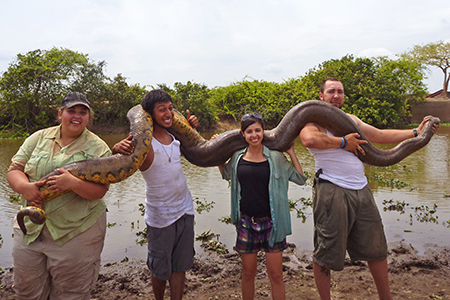
Highlands students Lisa McBride, left, Steven Salinas, Rose Peralta, and Justin Saiz hold a 156-pound anaconda during a research expedition to the Venezuelan Llanos led by Highlands biology professors Jesíºs Rivas and Sarah Corey-Rivas.
Las Vegas, N.M. — Four New Mexico Highlands University students joined their biology professors on a two-week research expedition deep in the Venezuelan Llanos to study anacondas and other tropical wildlife.
In April, biology professors Jesíºs Rivas and Sarah Corey-Rivas took Lisa McBride, Justin Saiz, Steven Salinas, and Rose Peralta on an unforgettable journey of scientific inquiry into the Llanos, a vast tropical grassland plain that floods seasonally, creating the second-largest wetland in the world.
McBride and Saiz graduate May 10 with B.S. degrees in biology. Salinas is a biology junior and Peralta is a forestry senior.
The Highlands research team captured, studied and released 54 anacondas — including a 156-pound female they relocated to a river habitat far from the family with young children where they found her.
In addition to anaconda research, the students conducted a density and diversity study of tropical waterfowl and did night surveys of mammals.
For Salinas, a 21-year-old native of rural Ribera, N.M., it was his first trip out of the country. He has worked in Rivas’ Ecology Laboratory since he was a freshman.
“For me, the best thing about this research expedition was seeing the huge variety of tropical wildlife, from the anacondas to giant river otters and pink river dolphins,” Salinas said. “It was breathtaking to see the dozens of colorful, exotic bird species gathered along the edge of the water, like the Hoatzin with its purple face and golden Mohawk.
“I never thought I’d have this unbelievable, life-changing kind of opportunity for hands-on learning in biology fieldwork. I’ve learned so much with Dr. Rivas — he’s very inspiring — and I’m honored and grateful to be selected for this Venezuelan trip,” said Salinas, who plans to pursue graduate studies in either wildlife biology or zoology.
“It’s important that we show students what the work of a biologist is like,” Rivas said. “This hands-on full immersion research experience stressed that knowledge about wildlife species is the most important tool we have for conservation.”
Rivas said anacondas are gentle giants that are calm and not aggressive. It’s possible to capture the snakes safely because they tire quickly after about a minute of being held behind their head.
“This kind of onsite research allows for learning deeply and well without distractions, and builds the students’ self-identity and confidence as researchers,” Corey-Rivas said. “The students studied wildlife ecology and conservation of endangered species from all angles, from behavior to demographics to genetics.”
Rivas and Corey-Rivas are married and joined the Highlands faculty in 2010.
Rivas is a Venezuelan-born wildlife biologist and the world’s foremost expert on anacondas. He has studied the giant snakes for 22 years and founded the ongoing Anaconda Project in 1992, which focuses on research and conservation.
Corey-Rivas has also studied anacondas extensively. Her research interests include conservation genetics, as well as landscape ecology of reptiles and amphibians.
At Highlands, the professors are now also studying New Mexico species of concern with their students, from native leopard frogs to bison.
McBride, 23, earned magma cum laude. She worked in Corey-Rivas’ Molecular Ecology Laboratory for more than three years, and begins her biology graduate studies at Highlands this fall.
“I’ll be incorporating the research methods I learned on this trip for my graduate research on the endangered Mexican garter snakes, which are native to New Mexico,” McBride said. “It was fascinating to learn about the fluctuating habitat for wildlife between the wet and dry seasons in the Llanos.”
McBride, who plans to eventually pursue a doctorate in ecology and evolution, said she’s grateful for the once in a lifetime opportunity to study anacondas in Venezuela with her biology professors.
“Dr. Corey-Rivas is my adviser and she’s an incredible professor, researcher and mentor. Her passion for conservation is very motivating,” McBride said.
Peralta’s senior project will focus on the anaconda’s diet, including birds. The 24-year-old from Albuquerque will analyze the anaconda’s stool for her study.
“I learned about anaconda’s behavior, diet, breeding, and prey,” Peralta said. “It was such an exciting, exotic adventure to search and capture the snakes, walking barefoot through the Llanos. This expedition made me realize that wildlife research is my passion, and I want to pursue my masters in wildlife biology.
“What I love about Highlands is you get to experience so many research opportunities in the field and lab. My forestry and biology professors are so knowledgeable, welcoming and enthusiastic.”
The biology professors self-funded the research trip, with help from a CITGO grant and a Faculty Research Committee contribution for some travel expenses.
